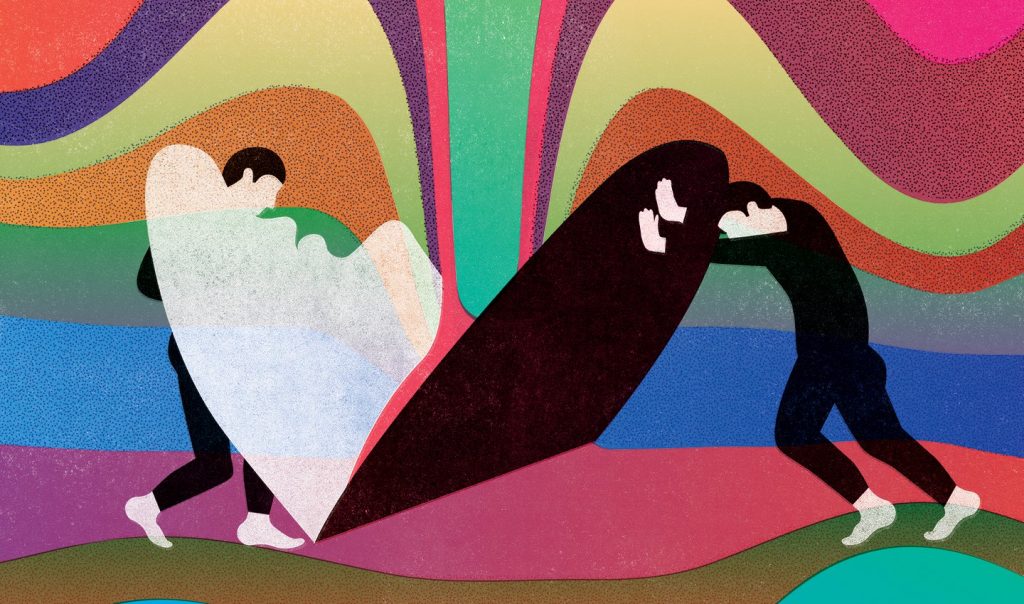
Freedom is the fundament of morality, since only when we have the possibility to choose, can we act morally. One’s freedom does not end when the other’s freedom starts. On the contrary, one’s freedom begins in the other’s freedom, within an intersubjective context: “I am the other of the Other and the Other is the other of mine and we both exist within the co-construction of our identities”. Lévinas pointed out that the Self is responsible for the Other, being this responsibility called forth by the other’s face:
The Other faces me and puts me in question and obliges me.
(Totality and Infinity 207)
The first word of the face is the “Thou shalt not kill.” It is an order. There is a commandment in the appearance of the face, as if a master spoke to me. However, at the same time, the face of the Other is destitute; it is the poor for whom I can do all and to whom I owe all.
(Ethics and Infinity 89)
Covid has unveiled the invisible world we were already living before.
Isolated Others, for whom no Self seems to assume responsibility, even if it cannot escape being responsible; information flowing through social media and mass media, without contributing to knowledge construction; a masquerade of global communication in a digital world made up of walls that separate groups of people by their virtual realities; a de-objectified world, where objects have lost their magic, being replaced by disposable words, truths, information:
The digital order deobjectifies the world by rendering it information,’ he writes. ‘It’s not objects but information that rules the living world. We no longer inhabit heaven and earth, but the Cloud and Google Earth. The world is becoming progressively untouchable, foggy and ghostly.
(Byung Chul-Han, Undinge: Umbrüche der Lebenswelt, Ullstein Verlag)
Covid first presented itself as a tragic scene with no real choices of action. Therefore, we experienced alienating amoral situations that caused burnout to health professionals, policy decision makers and the citizens enclosed at home or enclosed outside, because of their homelessness. After three or four waves, where do we stand now?
The virus seems to be under control due to scientific knowledge and the sense of responsibility for the common good enacted by most people. Reciprocity, Responsibility and Respect for the Other were highlighted as the pillars of post-covid History. However, the positive outputs of the pandemic should be regarded with suspicion. With the political measures to control the spread of the virus, the division between US and the OTHER has inscreased: US, the healthy, the vaccinated, the ones accomplishing with the rules; the OTHERS, the infected, the non-vaccinated, the ones questioning the norms. On top of this, Covid status certificates may contribute to unlawful discrimination, with the slogan no jab, no job raising strong opposition by many citizens. In a recent article published in the New England Medical Journal, the authors point out five reasons why green passes are ethically questionable:
First, while vaccine supply remains limited, privileging people who are fortunate enough to have gained early access is morally questionable. Second, even after supply constraints ease, rates of vaccination among racial minorities and low-income populations seem likely to remain disproportionately low; relatedly, if history is a guide, programs that confer social privilege on the basis of “fitness” can lead to invidious discrimination. Third, the extent of protection conferred by vaccination, particularly against new variants, is not yet well understood, nor is the potential for viral transmission by people who have been vaccinated. Fourth, privileging the vaccinated will penalize people with religious or philosophical objections to vaccination. Finally, we lack a consensus approach to accurately certifying vaccination.
(M. A. Hall, D. M. Studdert. “Vaccine Passport” Certification — Policy and Ethical Considerations, New England Journal of Medicine, March 2021, DOI: 10.1056/NEJMp2104289)
Green passes could be green if they would actually open up the path for human beings to live in a more humane world. One of the main lessons to be learnt from Covid, is the need to listen to and to engage the Other in public health policies. Therefore, vaccine passport certification can only be green if:
- It is temporarily implemented (being this period of time clearly defined) together with alternative options for those who are not vaccinated (either as a personal choice or due to lack of access to vaccination);
- Governments engage citizens in the tailoring of restrictions and the certificate is presented as a choice and not as an obligation, with the alternative options being clearly defined;
- The companies responsible for developing the technology underlying the use of digital certificates assume co-responsibility for the ethical issues related to the programmers’ work;
- We all listen to each other’s narrative, knowing that telling the story of the pre-covid world is essential to give a future to our memory:
These are the last things, she wrote. One by one they disappear and never come back. I can tell you of the ones I have seen, of the ones that are no more, but I doubt there will be time. It is all happening too fast now, and I cannot keep up.
The government doesn’t like it when people make up stories. It’s bad for morale. You see what you are against here. It’s not just that things vanish –but once they vanish, the memory of them vanishes as well.
(Paul Auster. 1987. In the Country of Last Things. London: Faber and Faber)
Let’s provide space and skills for listening to each other, seeing ourselves in the mirror, so that we do not forget that each one is responsible for the Other, in an integrative, reciprocal and equitable world. If we lose track of this world, memories will vanish and what is nowadays still considered unethical, will be pathologically normalized. Hope lies in the possibility of change inscribed in every story we think with.
